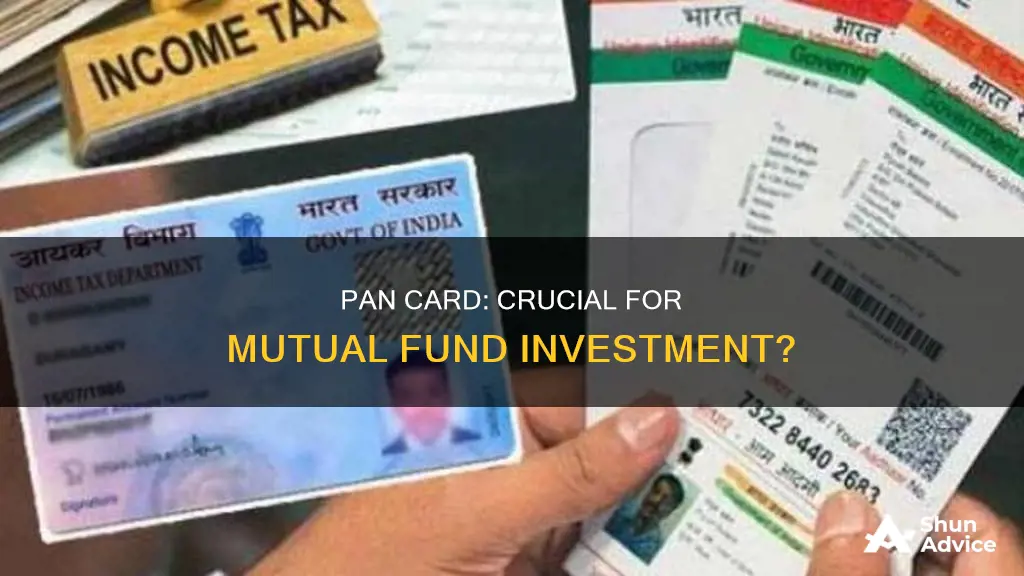
In India, a PAN card is a crucial document for various financial transactions, including investing in mutual funds. The Permanent Account Number (PAN) card, issued by the Indian Income Tax Department, is necessary for tax-related transactions and serves as a unique identifier for individuals and organisations. While it is typically required for opening investment accounts, there are certain exceptions and alternative documents that allow individuals to invest without a PAN card. This topic explores the role of the PAN card in mutual fund investments and the specific requirements and alternatives in India.
What You'll Learn

PAN Card is required to open a mutual fund investment account
In India, a PAN card is required for many financial operations, including opening a bank account, purchasing or selling real estate, making investments, and submitting income tax returns. The Permanent Account Number (PAN) card is issued by the Indian Income Tax Department to people and organisations for use in tax-related transactions.
A PAN card is a unique identifier for investors, enabling the government to monitor and confirm their financial activities. It is also a recognised form of identification, which helps to prevent fraudulent activity in the stock market.
The Know Your Customer (KYC) procedure, necessary for investing in mutual funds, stocks, and other financial instruments, uses the PAN card's data, such as name and address.
Therefore, a PAN card is required to open a mutual fund investment account. Without a PAN card, it is not possible to open a mutual fund investment account in India.
However, there are some exceptions. The Securities and Exchange Board of India (SEBI) has stated that investors can invest up to Rs. 50,000 in each fund house every year without having to quote their PAN. Instead of a PAN card, investors can use a voter ID card, government ID card, driving license, or passport for KYC compliance.
A Beginner's Guide to UAE Mutual Fund Investing
You may want to see also

PAN Card is necessary for tax-related requirements
In India, a PAN card is a requirement for tax-related purposes. The revenue from investments is taxed on the individual who makes them. Therefore, the government requests that investors supply their PAN information so that it can track and monitor the revenue from investments.
The Permanent Account Number (PAN) card is issued by the Indian Income Tax Department to people and organisations for use in tax-related transactions. It is a unique identity document that enables the government to monitor and confirm the investor's financial activities.
The PAN card is required to open any type of investment account, such as a DEMAT, trading, or mutual fund account. These accounts cannot be opened without a PAN card.
The PAN card also serves as a form of identification for the investor. It guarantees that the investment is being made by an authorized investor and helps to prevent fraudulent activity in the stock market.
Additionally, the Know Your Customer (KYC) procedure, which is necessary for investing in mutual funds, stocks, and other financial instruments, uses the PAN card's data, such as the name and address of the investor.
While it is possible to invest in mutual funds without a PAN card, there are limits to the amount that can be invested. Investors can invest up to ₹50,000 per mutual fund without a PAN Card. For larger investments, a PAN card is required.
A Beginner's Guide to S&P 500 Fund Investment
You may want to see also

PAN Card is used for investor identity confirmation
The Indian Income Tax Department issues PAN (Permanent Account Number) cards to people and organisations for use in tax-related transactions. A PAN card is a unique identification document that enables the government to monitor and confirm the investor's financial activities.
In India, a PAN card is required for many financial operations, including opening a bank account, purchasing or selling real estate, making investments, and submitting income tax returns. The revenue from investments is taxed on the individual who makes them, so the government requests that investors supply their PAN information to track and monitor the revenue from investments.
The investor's identity may be verified using their PAN card, a recognised form of identification. It guarantees that the investment is being made by an authorised investor and prevents fraudulent activity in the stock market. The Know Your Customer (KYC) procedure, necessary for investing in mutual funds, stocks, and several other financial instruments, uses the PAN card's data, such as name and address.
The PAN card is a mandatory document for investing in India, as it is required to create investment accounts, is needed for tax purposes, aids in identification and verification, and makes the investing process easier.
BPI Equity Fund: A Smart Investment Strategy
You may want to see also

PAN Card makes the investment process hassle-free
In India, a PAN card is a crucial document that facilitates seamless investment processes. Here's how it makes investing hassle-free:
Simplified Know-Your-Customer (KYC) Process
The Know Your Customer (KYC) procedure, a prerequisite for investing in mutual funds, stocks, and various other financial instruments, relies on the personal information provided through the PAN card, such as the investor's name and address. By having a PAN card, individuals can quickly and efficiently complete the KYC process, saving time and effort.
Streamlined Investment Account Opening
Whether it's a DEMAT account, a trading account, or a mutual fund account, a PAN card is essential to get started with investing in India. This means that without a PAN card, individuals cannot open these types of investment accounts, creating a barrier to their financial endeavours.
Tax-Related Convenience
The PAN card is linked to taxation in India. When individuals invest, the revenue generated is taxed, and the PAN card enables the government to track and monitor this investment income. By providing PAN card details, investors can ensure that their tax obligations are met, avoiding potential issues down the line.
Secure and Verified Transactions
PAN cards serve as a recognised form of identification, allowing for the confirmation and verification of the investor's identity. This measure helps prevent fraudulent activities in the stock market and ensures that only authorised investors are making investments. The PAN card adds an extra layer of security to financial transactions, protecting investors and their assets.
Centralised Record-Keeping
The Association of Mutual Funds in India (AMFI) has directed fund houses to implement centralised record-keeping of all Know Your Customer (KYC) documents, using PAN details. This means that investors won't have to repeatedly submit their documents with each mutual fund investment. This centralised system simplifies the process, especially for those investing across multiple mutual funds, making it more convenient and efficient.
In summary, a PAN card is not just a requirement for investing in India but also a tool that simplifies the investment process. It streamlines account opening, facilitates tax compliance, enhances security, and enables centralised record-keeping. By obtaining a PAN card, individuals can efficiently navigate the financial landscape and pursue their investment goals with greater ease and confidence.
Investing in Commodity Funds: Why Do People Do It?
You may want to see also

PAN Card is mandatory for investing in the stock market
In India, a PAN card is a crucial document for various financial transactions, and this includes investing in the stock market. Here's why a PAN card is mandatory for stock market investments:
Opening an Investment Account
To open any type of investment account, such as a Demat Account or a Mutual Fund Account, a PAN card is required. It is not possible to open a Demat Account without a PAN card. Therefore, if you plan to invest in shares or mutual funds, a PAN card is essential. This is because the PAN card serves as a unique identifier for the investor, enabling the government to monitor and confirm their financial activities.
Tax-Related Requirements
When filing tax returns, a PAN card is necessary. Revenue generated from investments is taxed on the individual making those investments. By providing PAN card details, the government can track the revenue generated through investments. This ensures compliance with tax regulations.
Identity and Confirmation
A PAN card is a valid form of identification, and it can be used to verify the identity of an investor. This confirmation ensures that the investor is authorised to make investments and helps prevent fraudulent activities in the stock market. The Know Your Customer (KYC) process, which is required for investing in stocks, mutual funds, and other financial instruments, also relies on the information provided on the PAN card, such as the name and address of the investor.
Hassle-Free Investments
The PAN card simplifies the investment process. The KYC procedure, which is crucial for investing in mutual funds, stocks, and other financial instruments, utilises the personal information from the PAN card. This includes basic details such as name and address, which are required to comply with money laundering prevention rules.
Specific Investments Requiring a PAN Card
The purchase of equity shares listed on Indian stock markets necessitates a PAN card. Additionally, when registering for a Demat or trading account, investors must provide their PAN information. Investing in mutual funds, derivatives (options and futures), and certain types of bonds also requires a PAN card.
In summary, a PAN card is a prerequisite for investing in the stock market in India. It serves as a unique identifier, aids in tax compliance, facilitates the investment process, and helps curb fraudulent activities.
Proprietary Funds: Risky Business for Investors
You may want to see also
Frequently asked questions
Yes, a PAN card is required to invest in mutual funds.
A PAN card is required for several reasons, including:
- To open an investment account: A PAN card is necessary to open any type of investment account, including a mutual fund account.
- Tax-related requirements: The revenue generated from mutual fund investments is taxed, and a PAN card is required to file taxes.
- Identity and confirmation: A PAN card serves as a valid form of identification and helps verify the investor's identity.
- Hassle-free investment: The Know Your Customer (KYC) process, which is mandatory for mutual fund investments, requires the investor's PAN card details.
PAN stands for Permanent Account Number. It is a 10-digit alphanumeric code that serves as a unique identifier for Indian taxpayers. The Indian Income Tax Department issues PAN cards to individuals and organisations for tax-related transactions.
A PAN card helps streamline the investment process by acting as a valid form of identification and enabling the completion of the mandatory KYC process. It also aids the government in monitoring and confirming the investor's financial activities, including tax payments on mutual fund revenues.
To obtain a PAN card, you need to:
- Visit the official website of the Income Tax Department or National Securities Depository Limited.
- Download and fill out Form 49A, providing the necessary details and documents, including proof of identity and residence.
- Submit the form at any of the designated service centres, and your PAN card will be couriered to your mailing address within a specified timeframe.







